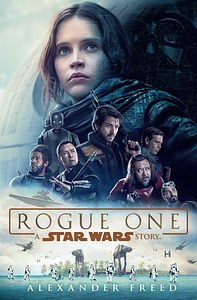You need to sign in or sign up before continuing.
Take a photo of a barcode or cover
I knew all of this was just a big love letter from Cassian to Jyn and I was not disappointed. When I first saw the film I just wanted more of all of these characters. Getting inside each other heads during pivotal moments was fascinating. As much as I wish there was an alternate ending, the ending in both the movie and book are beautiful and heartbreaking.
The 3rd act is one of the best action scenes I've seen in a movie in a long time and the book version did not disappoint either.
The 3rd act is one of the best action scenes I've seen in a movie in a long time and the book version did not disappoint either.
Spoiler
The deaths seemed even more prominent in the book because it was literally the next chapter where someone dies after K-2. Then Chirrut. Then Bodhi. Then Baze. Then my soul.
adventurous
dark
mysterious
sad
slow-paced
Plot or Character Driven:
Plot
Strong character development:
Yes
Loveable characters:
Yes
Diverse cast of characters:
Yes
Flaws of characters a main focus:
Complicated
challenging
dark
sad
tense
medium-paced
Plot or Character Driven:
A mix
Strong character development:
Yes
Loveable characters:
Complicated
Diverse cast of characters:
Yes
Flaws of characters a main focus:
Complicated
Graphic: Death
this is a novelization that exceeds all expectations & tbh it would've done amazing as even just a standalone novel. the prose is a gift & diving into all these characters - i knew it would be gutwrenching, i knew it would be amazing. i love all my rogues so much (and the rebel alliance, especially mon mothma). also the supplemental data was a genius idea
in a kinder universe, indeed.
in a kinder universe, indeed.
It is a period of civil war.
Rebel spaceships, striking
from a hidden base, have won
their first victory against
the evil Galactic Empire.
During the battle, Rebel
spies managed to steal secret
plans to the Empire's
ultimate weapon, the DEATH
STAR, an armored space
station with enough power
to destroy an entire planet.
Since the time we all first saw that opening crawl of Star Wars Episode IV: A New Hope, many of us have wondered about the details regarding that battle and the brave rebel spies who stole the plans to the original Death Star. This review will assume that you have seen the movie that this novel is an adaptation of.
If you haven't seen the movie, stop now. Spoilers ahead!
For those big into reading, "The book is better," is a very common term. I've found that this isn't always true for books written as an adaptation for a movie script rather than the other way around. The Rogue One adaptation by Alexander Freed is one of those that challenges that pattern for me.
This book adds an incredible amount of background information to the story of Rogue One and its characters. The beginnings of chapters often contain messages or memos sent between important figures that give incredible insight into behind-the-scenes action. These include messages between Galen, Krennic, and other Death Star design personnel, messages between Mon Mothma and other members of Alliance Command, and others.
The biggest jewel contained in the novel, hands down, is the motivation of all the characters involved. In a way that is easier for a book to do over a movie, you are given insight into the minds and thoughts of every major character involved including the main Rogue One team but also Saw, Mon Mothma, General Draven, Tarkin, Krennic, Galen, Lyra, and others. I learned a ton of information about the Alliance to Restore the Republic and Mon Mothma without any boring exposition or loss of pacing.
Each death of the main crew is made more poignant because you know each character so much better than you do just from watching the movie. I know about Bodhi Rook's history and the source of his many insecurities, not to mention the entire Bor Gullet scene actually makes sense, has repercussions, and fits into the story better.
Chirrut is still my favorite character. I love his humor, dedication, and understand more about his religious connection to The Force of Others as he calls it, and his life as a Guardian of the Whills. (There is also some neat behind-the-scenes history behind that order, look it up on Wikipedia).
I could go on and on about each character and how much this book expands your understanding and appreciation of them, but really, you just need to go and read the book. If you like Star Wars, if you liked Rogue One at all, this is a true gem. Go read it.
Rebel spaceships, striking
from a hidden base, have won
their first victory against
the evil Galactic Empire.
During the battle, Rebel
spies managed to steal secret
plans to the Empire's
ultimate weapon, the DEATH
STAR, an armored space
station with enough power
to destroy an entire planet.
Since the time we all first saw that opening crawl of Star Wars Episode IV: A New Hope, many of us have wondered about the details regarding that battle and the brave rebel spies who stole the plans to the original Death Star. This review will assume that you have seen the movie that this novel is an adaptation of.
If you haven't seen the movie, stop now. Spoilers ahead!
For those big into reading, "The book is better," is a very common term. I've found that this isn't always true for books written as an adaptation for a movie script rather than the other way around. The Rogue One adaptation by Alexander Freed is one of those that challenges that pattern for me.
This book adds an incredible amount of background information to the story of Rogue One and its characters. The beginnings of chapters often contain messages or memos sent between important figures that give incredible insight into behind-the-scenes action. These include messages between Galen, Krennic, and other Death Star design personnel, messages between Mon Mothma and other members of Alliance Command, and others.
The biggest jewel contained in the novel, hands down, is the motivation of all the characters involved. In a way that is easier for a book to do over a movie, you are given insight into the minds and thoughts of every major character involved including the main Rogue One team but also Saw, Mon Mothma, General Draven, Tarkin, Krennic, Galen, Lyra, and others. I learned a ton of information about the Alliance to Restore the Republic and Mon Mothma without any boring exposition or loss of pacing.
Each death of the main crew is made more poignant because you know each character so much better than you do just from watching the movie. I know about Bodhi Rook's history and the source of his many insecurities, not to mention the entire Bor Gullet scene actually makes sense, has repercussions, and fits into the story better.
Chirrut is still my favorite character. I love his humor, dedication, and understand more about his religious connection to The Force of Others as he calls it, and his life as a Guardian of the Whills. (There is also some neat behind-the-scenes history behind that order, look it up on Wikipedia).
I could go on and on about each character and how much this book expands your understanding and appreciation of them, but really, you just need to go and read the book. If you like Star Wars, if you liked Rogue One at all, this is a true gem. Go read it.
Having read [b:Catalyst - A Rogue One Novel|29662066|Catalyst - A Rogue One Novel|James Luceno|https://images.gr-assets.com/books/1468671681s/29662066.jpg|50028005] and seen the Rogue One film, and having read Freed's other Star Wars novel ([b:Battlefront - Twilight Company|25455901|Battlefront - Twilight Company|Alexander Freed|https://images.gr-assets.com/books/1440781979s/25455901.jpg|45222133]), I read this novel with very high expectations and was not disappointed.
Freed's novelization is remarkable for two reasons. First, it helps flesh out much of the subtext that characterized the film version. In the film, we were often left to try to decipher cryptic looks from Jyn, Cassian, and others, which confused many viewers. By drawing out internal dialogue and reasoning, Freed greatly enriches many of these interactions. In doing so, he also builds more depth into characters who received less attention in the film, like Chirrut, Baze, Bodhi, and General Draven. We also learn a bit more about Jedha, the Kyber Crystals (which were terribly underutilized in the film), and the psychology of Krennick and Jyn. Second, the novelization helps build the culture of the rebellion - we see even more clearly how desperate, fractured, and uncertain they are. We get a better sense of the camaraderie of the troops (Sefla, while a minor character, is a personal favorite) and the disconnects within Alliance command.
In many ways, I think of Rogue One as the first attempt to take a piece of the canon EU and commit it to film. The novelization helps connect more fully to the EU. While I'd still probably recommend [b:Lost Stars|25067046|Lost Stars (Star Wars Journey to the Force Awakens)|Claudia Gray|https://images.gr-assets.com/books/1462731623s/25067046.jpg|44751860] or [b:Catalyst - A Rogue One Novel|29662066|Catalyst - A Rogue One Novel|James Luceno|https://images.gr-assets.com/books/1468671681s/29662066.jpg|50028005] as a first book for those wanting to explore the new canon EU, this is a good gateway novel and excellent contribution.
Freed's novelization is remarkable for two reasons. First, it helps flesh out much of the subtext that characterized the film version. In the film, we were often left to try to decipher cryptic looks from Jyn, Cassian, and others, which confused many viewers. By drawing out internal dialogue and reasoning, Freed greatly enriches many of these interactions. In doing so, he also builds more depth into characters who received less attention in the film, like Chirrut, Baze, Bodhi, and General Draven. We also learn a bit more about Jedha, the Kyber Crystals (which were terribly underutilized in the film), and the psychology of Krennick and Jyn. Second, the novelization helps build the culture of the rebellion - we see even more clearly how desperate, fractured, and uncertain they are. We get a better sense of the camaraderie of the troops (Sefla, while a minor character, is a personal favorite) and the disconnects within Alliance command.
In many ways, I think of Rogue One as the first attempt to take a piece of the canon EU and commit it to film. The novelization helps connect more fully to the EU. While I'd still probably recommend [b:Lost Stars|25067046|Lost Stars (Star Wars Journey to the Force Awakens)|Claudia Gray|https://images.gr-assets.com/books/1462731623s/25067046.jpg|44751860] or [b:Catalyst - A Rogue One Novel|29662066|Catalyst - A Rogue One Novel|James Luceno|https://images.gr-assets.com/books/1468671681s/29662066.jpg|50028005] as a first book for those wanting to explore the new canon EU, this is a good gateway novel and excellent contribution.
adventurous
dark
emotional
hopeful
inspiring
tense
medium-paced
Plot or Character Driven:
A mix
Strong character development:
Yes
Loveable characters:
Yes
Diverse cast of characters:
Yes
Flaws of characters a main focus:
Yes
How dare a Star Wars novel make me tear up. The audacity.
It may have been harder to read and listen to this than it was to watch it. There's so much more detail and insight into each character, especially at the end.








